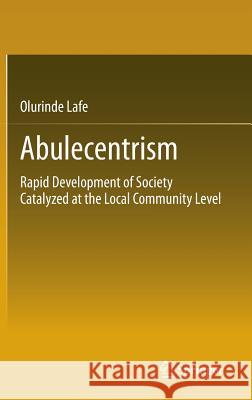Abulecentrism: Rapid Development of Society Catalyzed at the Local Community Level » książka
Abulecentrism: Rapid Development of Society Catalyzed at the Local Community Level
ISBN-13: 9783319010229 / Angielski / Twarda / 2013 / 173 str.
The book describes a development concept called abulecentrism. The Yoruba word abule (pronounced: a-boo-lay) literarily means "the village." abulecentrism seeks to achieve rapid and sustainable development of a given society by the strategic execution of projects and the provision of critical services at the local community level. The village has always been the traditional unit of communal living in many societies around the world. The typical village is small, comprising close-knit social groups and individuals that number in the tens, or at most, low hundreds. In a village, people live close to one another, and derive strength in their communal methods of living, working and protecting their society. Furthermore, the management and governance of the community is simpler than in urban areas because the village requires smaller administrative systems. abulecentrism is built on the philosophy of using small, modular systems, such as a village, as building blocks for developing the greater society. The ultimate goal of abulecentrism is for the larger society to be significantly impacted by the dividends of the aggregated development attained within the different communities. Development projects will typically be executed by starting with a few local communities and progressing organically until all the communities that make up the larger society have been impacted.











